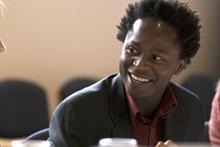Former boy soldier seeks for world peace
World peace can be achieved through opportunity and education, Ishmael Beah, author of “A Long Way Gone,” said to students Saturday morning.
Stressing global interconnection and the rarity of formal education throughout the world, Beah said by learning about different cultures and problems, students can make a difference. With education comes a further understanding of feasible solutions applicable to different problems.
“When you have that knowledge,” he said, “then you can impact someone’s life.”
Beah’s book, this year’s common literature experience selection and required reading for Connections students, was his memoir of his experience in the Sierra Leone civil war in the early 1990s.
A refugee at age 12, he was recruited by the state army at age 13, where he fought until being removed by UNICEF workers at 16. Eventually, he was rehabilitated and moved to New York City where he finished high school before attending Oberlin College in Ohio.
During his last few semesters at Oberlin Beah began writing his experiences and was encouraged to finish them as a book by a professor. In writing his memoir, Beah said he sought solitude to write.
“I needed to be lonely, I needed to be in a sad emotional state to go back,” he said.
He was able to write descriptively from memory, he said, because his culture was so focused on oral tradition and had no written language. Also, he said, the events that happened were so different that he remembers them vividly, much like looking at an art book for the first time.
“The things that happened in Sierra Leone were so different they stuck with me,” he said.
The book was very difficult to write, he said, but he wrote it for several reasons.
First, he said, was to show the world that recovery of a “lost boy” was possible. Because the conflict in some areas is so widespread, children are frequently exposed to violence and are sometimes forced to watch their families die or, like Beah, forced to fight. Despite common opinion, he said, these children can be taught to live a normal, peaceful life again.
“A lot of people think that recovering is forgetting. In my case, it’s not,” he said, and said it was more coming to terms with the situation and his life.
He credits his rehabilitation to many sources, chiefly the persistence and kindness of the UNICEF workers, and said they restored his humanity.
“I wanted to write about the power and the strength of the human spirit and its ability to recover,” he said.
Another reason, he said, was that he wanted to give a more detailed view of the nature of war than he said usually appears in the news. He critiqued media coverage of conflicts such as the Sierra Leone civil war and said it frequently ignored the peaceful country it had once been or could be again. When the humanity is taken from a war, the individual men and women in it, it hoped to put the war into context. He said he also hoped with greater understanding of war and a soldier’s mindset into it, people wouldn’t blame soldiers for acts of war they may have committed.
“When you get back from a battle, you don’t sit down and say ‘Now, what were the moral implications of this?’,” he said. “You can’t stop to think. One bullet and that’s it.”
Beah also ate breakfast with 16 students who had won an essay contest to do so. They each were allowed to ask Beah one question. Among these questions were concerns about other conflicts in Africa and the role of the U.N. in global peace. Beah said that, although he thought the U. N. needed a lot of improvement, it was the only organization that will go into places where a government might not currently exist.
On whether he thought the U.S. or other superpowers should get involved with such civil conflicts such as Sierra Leone or Darfur, Beah said that more could be done by early intervention rather than sending troops. If something happens somewhere in the world and is not stopped, he said, it can spread and become everyone’s problem. Intervention would be quicker, easier, and far less violent than trying to stop a war. A long-term perspective when dealing with violence is necessary, too, he said.
“When a war ends, it doesn’t mean the things that caused the war are gone,” he said.
Providing opportunities, he said, is perhaps the best way to avoid conflict. Violence and extreme means for change begin when people are desperate and poor, he said, because when they have lost their self-respect, they are capable of anything.
Asking people what they want, too, instead of assuming a certain country’s culture and comforts are a perfect fit for everyone is essential to a peace, too, he said. He cited a movement trying to give a laptop to every child in Africa. This isn’t necessarily a good idea for Africans, he said, because many villages don’t have electricity and many people would simply sell the computer to buy food. A better way to help Africans would be to give them food or help them produce more, he said.
To the incoming freshman, Beah stressed the unique opportunity they had of obtaining formal, advanced education. He said in Sierra Leone primary school was taught under a mango tree but in America having school indoors is taken for granted. Access to education when he came to America, he said, changed his life. Students can use their opportunity for education to better the world, he said.
“Use education as a way to expose yourself to the world,” he said.
He said students should not feel bad about having more opportunities but instead appreciate them. Students should appreciate their education and take advantage of it, he said.
“Look at this time here (at USU) as a journey of education and self-discovery,” he said.
-lisa.m.christensen@aggiemail.usu.edu

